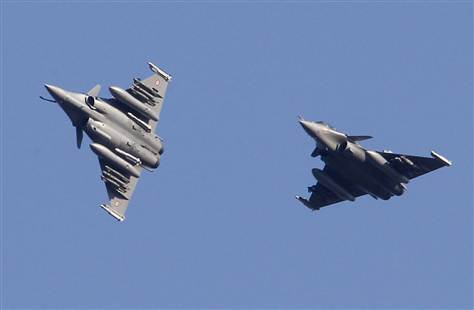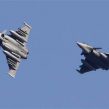
NATO in Libya: An Improvised Intervention
Publication: Eurasia Daily Monitor Volume: 8 Issue: 96
By:

The United States kick-started the Libya operation on March 19, in charge of Operation Odyssey Dawn, and launching air and missile strikes until April 3. The French, British, and several other governments (some of them with caveats) joined the operation from the outset. Washington, however, planned to download the brunt of the operation onto NATO as quickly as possible. On March 24, NATO accepted responsibility for enforcing the no-fly zone over Libya. On March 27, NATO decided to take command of all the Libya operations. On March 31, the Alliance launched Operation Unified Protector, folding the US operation into NATO’s; and on April 3 the United States announced the cessation of its own participation in combat activities.
The Obama administration acted as it did under conflicting priorities and pressures. Its own liberal and humanitarian interventionists pressed for immediate military action in Libya. According to press reports, Secretary of State Hillary Clinton, US Ambassador to the UN Susan Rice and National Security Council’s multilateral affairs director Samantha Power (three top exponents of the responsibility-to-protect doctrine) persuaded President Barack Obama to seek the UN Security Council’s authorization for military intervention in Libya. The primary moral argument was that the United States must prevent a Libyan repeat of the earlier massacres in Rwanda and Sudan. Apart from this, the Obama administration believed that the hoped-for Arab democratic revolutions would be rolled back if Libya’s Colonel Muammar Gaddafi set an example of defeating his opponents.
An over-extended and under-funded Pentagon, however, could hardly intervene in Libya on top of the ongoing operations in Afghanistan and Iraq. Defense Secretary Robert Gates and the Joint Chiefs of Staff resisted that proposal. President Obama, having just launched his re-election bid, could hardly risk yet another war. The administration’s decision was an internal compromise: the United States would take the lead in launching the Libya operation, but it would strictly limit the duration and scope of US participation, and it would delegate the intervention in Libya to a group of allies. The French and British governments were eager at that point, but Washington ruled out anything reminiscent of the 1956 Franco-British project. Instead, the United States took the lead politically to assemble a coalition-of-the-willing, and turned to NATO for the overall command of the Libya operation.
The administration looked in a hurry to delegate and disengage. It set the date for Wednesday, March 30; and when that day came, it promised publicly to complete the move “by the weekend.” Indeed on Sunday, April 3, the administration announced the cessation of US participation in combat activities. As of that date, the United States withdrew its ground-attack planes, A-10 and AC-130, from the Libya operation—a move that has significantly weakened the impact of NATO’s air campaign to date. The US supreme commander of NATO in Europe, Admiral James Stavridis, has requested the Pentagon to commit those planes again to Libya action (an Italy-based squadron of eight planes, according to some reports). The Pentagon, however, felt that it could not release them (www.nato.int, April 14), and apparently still feels that way. According to Secretary Gates, the air war in Libya has already cost the under-funded Pentagon $750 million as of May 12 (Defense Department press release, May 12).
In his speech announcing the transfer of command to NATO, President Obama claimed credit for obtaining a UN Security Council mandate and assembling a coalition in just one month for this operation. While laying out an overwhelming moral case for removing Gaddafi from power, Obama nevertheless pledged that the US “would not put ground troops into Libya” (speech at National Defense University, White House press release, March 28).
Some European allies feel that Washington’s quick disengagement contravenes an important lesson of coalition management in Iraq and Afghanistan. That lesson is summarized as: “in together, out together.” In the Libya mission from April 4 to date, the United States is providing the high-end command and control capabilities (including those located at bases in Naples and Izmir), some logistics, a few unmanned Predator drones (just two, according to Pentagon sources, AFP, May 12), surveillance aircraft and almost certainly some undisclosed assets. However, the United States is not providing firepower to this NATO operation. Some US representatives publicly assert that Libya is marginal to US interests, and only Europe has major interests there (as if energy supplies were not a transatlantic concern). Some even take the line that “we” delegated the operation to “them”—implicitly referring to NATO as if it were a distinct entity from the US (Anne Applebaum, “Will the Libya intervention bring the end of NATO?” The Washington Post, April 11).
All this can suggest, even to some of Europe’s Atlanticists, that the Obama administration regards transatlantic security interests as no longer indivisible; and that it considers NATO as good for taking on operations the United States (for all its moralistic rhetoric) needs instant relief from—even before embarking seriously on a mission for swift, successful conclusion to US involvement.




